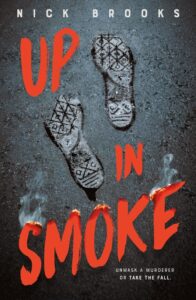There’s a war going on outside no teenager is safe from—and it’s not just in the streets. It’s in their pockets. It’s in their group chats. It’s on TikTok, YouTube, Twitch, Discord, and whatever app got hot yesterday. The battle for attention is real, with the amounts of reels, and let’s be… real—books are losing.
But here’s the twist: some books are fighting back. Some books are adapting, transforming, and meeting kids where they’re at. And those books, more often than not, are YA. Specifically, YA crime thrillers and mysteries. That genre has quietly—maybe even accidentally—become the front line for revolutionary storytelling.
Yeah, I said it. Not sci-fi. Not literary fiction. Not adult crime or historical epics. Right now, if you’re trying to plant seeds of rebellion, if you’re trying to talk about injustice, oppression, identity, violence, class, power, systems—and still actually get read—YA thrillers are where it’s at. And here are 5 reasons why:
The Hook Is the Weapon
First things first: you’ve gotta get them to open the book.
We live in the attention economy, and kids today are savages when it comes to content. If you don’t grab them by the throat on page one, they’re out. They’re back to scrolling, gaming, streaming, or scheming. So what do YA thrillers do better than anybody else?
They hook you. A body drops. A kid disappears. A secret gets whispered. The principal’s found dead or like my new novel, UP IN SMOKE, there’s a murder at a protest. That’s how you get them in the door.
YA thrillers understand that plot is the delivery system. The message? That’s what you sneak in once they’re already invested. Once they care. Once they’re suspicious. You don’t start with the lecture. You start with the lie. You start with the missing girl, the bloodstain, the text messages that don’t add up—and then you go to work. Peel it all back. Use the thrills to unearth the real.
And what you find underneath is often a system rotting from the inside.
YA Thrillers Say the Quiet Part Out Loud
You can just say more in YA thrillers. There’s a subversiveness built into the genre. You’ve got kids poking around, asking the questions adults won’t. They’re disobedient by design.
They’re solving crimes, but they’re also solving systems. Bringing down a “big bad”. Exposing the school-to-prison pipeline, pulling back the curtain on privilege and police corruption. They’re asking why the same Black and brown kids keep disappearing. Why the rich kids never pay the price. Why the rules only apply to some of us. Why justice always feels so damn fragile.
YA thrillers are Trojan horses. They’re putting real talk in kids’ hands and letting them carry it into schools, libraries, bedrooms, and detention halls. And because it’s wrapped in a whodunit, it gets past the gatekeepers. By the time a parent realizes the book is talking about abolition or decolonization, the kid’s already three chapters deep, rooting for the vigilante hacker trying to burn the whole system down.
And guess what? That’s the point.
Teens See the World Is Broken—They Want to Know How to Fix It
On tour for my last YA Thriller, PROMISE BOYS, a young lady asked me a shocking yet very important question. She stood up in an auditorium full of her peers and asked loud and proud, “how do we fight systemic oppression?” It told me all I needed to know. We need to stop pretending these kids don’t know what time it is.
They watched their schools turn into active shooter drills. They saw George Floyd get murdered on their phones. They know the climate is collapsing. They can see capitalism is cannibalizing their future. So when they pick up a book, they can tell immediately if an author “gets it”. And they’re looking for clues on how to fix a broken system.
YA thrillers, at their best, get it. They reflect back the chaos teens live in and offer solutions. They show kids fighting back, even when it’s messy. They show them taking control of the narrative, uncovering the truth, finding allies, risking everything just to be heard. They give teens power on the page, which makes it a little easier to imagine having power off the page too.
And that’s revolutionary.
Critical Thinking Is a Survival Skill Now—YA Thrillers Teach It Best
We’re living in an age of deepfakes, bots, propaganda, algorithmic rabbit holes, and TikTok “truthers” with massive followings and no fact-checks. Disinformation is everywhere. And the wildest part? Most adults can’t even tell what’s real anymore—so how do we expect kids to?
That’s what makes mystery and thriller stories so perfect. It’s participatory. The reader becomes the detective. They pick up on clues. They question the characters. They doubt the narrator. That’s what critical thinking is. YA thrillers teach that without ever stepping into a classroom.
They’re learning how to ask the right questions, spot inconsistencies, read between the lines, and sniff out the truth even when it’s buried under ten layers of lies. And once you get used to questioning a story’s logic… you start questioning the world’s logic. That’s when the real learning begins.
We Owe Them More Than Escapism
I hear people say sometimes, “Let the kids have fun. Don’t make everything political. Don’t burden them with all this real-world stuff.” And I get that. Kids deserve joy. They deserve fantasy, romance, escape.
But what they don’t deserve is silence. Or worse—lies.
The truth is, kids are living revolutionary lives every day just by surviving. Black Kids, Brown Kids, Queer Kids, Undocumented Kids, Disabled Kids, and the list goes on—they wake up every day fighting battles the world doesn’t even see. They deserve stories that acknowledge that fight. Stories that say: “You’re not crazy. You’re not alone. And yes, this sh*t is rigged.”
YA thrillers don’t shy away from that. They double down on it. They create spaces where justice might actually be possible. Even if it’s just for a few hundred pages.
So Now What?
If you’re a writer, write them. If you’re a teacher, assign them. If you’re a parent, recommend them. If you’re a publisher, elevate them. And if you’re a reader?
Pass them on. Talk about them. Build with them. Maybe even start with UP IN SMOKE.
Because YA thrillers aren’t just books. When done with intention, they’re blueprints. They’re resistance manuals disguised as murder mysteries. They’re survival guides smuggled into backpacks and lockers. They’re stories of rage, truth, transformation and revolution.
And the kids are reading.
***


















